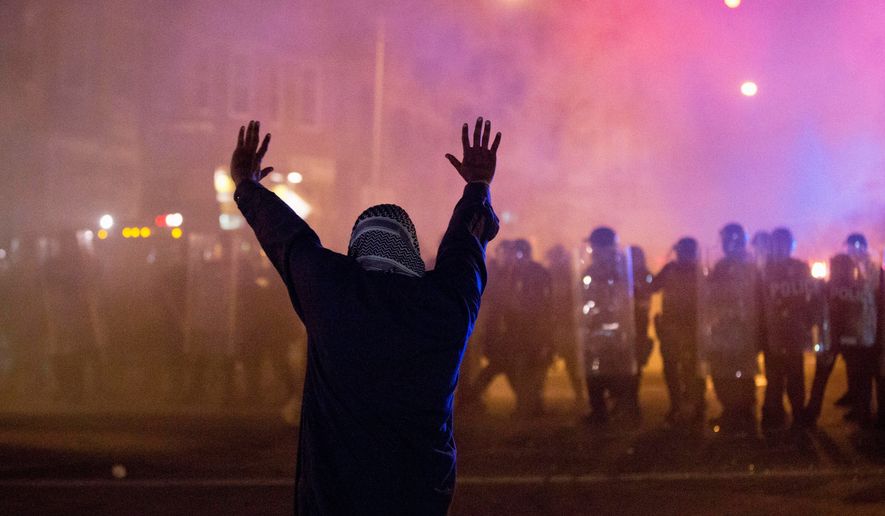Shooting and homicide rates are spiking in major U.S. cities including Baltimore and New York in the wake of nationwide protests against policing tactics such as stop-and-frisk and the questionable use of force against unarmed black men by law enforcement officers.
The number of shootings in Baltimore nearly doubled through May 31 compared with the same period last year, and homicides jumped from 86 to 131. The New York City Police Department said it had about a 9 percent increase in shootings and almost a 20 percent spike in homicides in that same period. Chicago also is reporting a rise in its homicide rate.
A nationwide debate, spurred by the deaths of unarmed black men at police hands, has officers conflicted about the best balance of fighting crime and protecting civilian rights. It also is creating turmoil for officers who are torn between upholding the law and protecting themselves from potential legal charges sought by elected officials and civil rights groups.
“There’s a feeling amongst the actual rank-and-file officers who are on the street, the men and women doing the job, that they do not enjoy the backup or the support of some elected officials,” said Bill Johnson, executive director of the National Association of Police Organizations. “Just like any other human being on the planet, police weigh the consequences of their actions in the back of their head before committing to any action. They ask themselves, ’Will I go the extra mile? Will I risk my career or my own freedom?’”
In New York City, Mayor Bill de Blasio was elected to office in 2013 largely on his campaign promise to end stop-and-frisk policing tactics. He said stop-and-frisk violated civil rights of minorities, who were the most likely to be questioned and patted down by officers if suspected of carrying weapons or drugs.
That same year, Baltimore eliminated stop-and-frisk after a federal court ruling found the practice unconstitutional. Stop-and-frisk has all but vanished from New York City, according to data collected by the American Civil Liberties Union, but Baltimore law enforcement still carries out “investigative stops,” a practice that elected officials have called into question after Freddie Gray sustained fatal injuries while in police custody in April.
As police face increased public scrutiny over the ways they do their jobs, criminals are becoming more emboldened in high-population cities across the country, Mr. Johnson said.
Jon Adler, national president of the Federal Law Enforcement Officers Association, agrees.
“There is a sense that there is opportunity to vent,” said Mr. Adler. “There is a sense that violent people can take action without repercussions, and that is caused by local civic leaders, weak civic leaders, that this is permissible.”
As anger flared in Baltimore over the death of Gray, Mayor Stephanie Rawlings-Blake said in a press conference that she wanted to give space to those “who wished to destroy,” though she said in subsequent interviews that her remarks had been distorted.
Mr. Adler, however, said comments like those, along with law enforcement’s overall friction with civil rights advocates and elected leaders, have resulted in an uptick in brazen efforts to commit crimes and flee from police or attack authorities.
In Dallas, a man armed with guns and pipe bombs boldly assaulted local police early Saturday. James Boulware said his actions were retaliation for the way police accused him of being a terrorist and deprived him of the right to see his child.
Other cities across the nation have experienced smaller but equally deadly acts of aggression.
In Chicago, the homicide number has climbed this year to 161, compared with 137 at the same point last year. In Newark, New Jersey, homicides and carjackings have risen to levels not seen in more than a decade.
Progress can be made only when civil justice advocates and police officers work together and respect one another instead of making one side — usually law enforcement officers — look like the bad guys, said Jonathan Thompson, executive director of the National Sheriffs’ Association.
“Dedicated law enforcement officers wake up every day, put on their star or badge and vow to earn the trust of hundreds of millions of law-abiding citizens of this country,” said Mr. Thompson. “This is the job they took and the trust they are sworn to honor. However, society, at every level, has an obligation too, and it’s long past the time that our leaders come together and reaffirm that social obligation.”
After the Baltimore riots, public opinion doesn’t seem to be on the side of law enforcement, and that will have a detrimental effect on everyday policing, Sen. Patrick J. Toomey, Pennsylvania Republican, said in a floor speech last month.
Officers are now wary that their actions to uphold the law might lead to their arrest and “a public mob that clamors for their conviction and threatens to burn down the city if the legal system finds them innocent,” Mr. Toomey said.
• Maggie Ybarra can be reached at mybarra@washingtontimes.com.




Please read our comment policy before commenting.